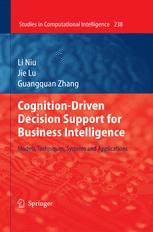

Most ebook files are in PDF format, so you can easily read them using various software such as Foxit Reader or directly on the Google Chrome browser.
Some ebook files are released by publishers in other formats such as .awz, .mobi, .epub, .fb2, etc. You may need to install specific software to read these formats on mobile/PC, such as Calibre.
Please read the tutorial at this link: https://ebookbell.com/faq
We offer FREE conversion to the popular formats you request; however, this may take some time. Therefore, right after payment, please email us, and we will try to provide the service as quickly as possible.
For some exceptional file formats or broken links (if any), please refrain from opening any disputes. Instead, email us first, and we will try to assist within a maximum of 6 hours.
EbookBell Team

4.4
42 reviewsCognition-driven decision support system (DSS) has been recognized as a paradigm in the research and development of business intelligence (BI). Cognitive decision support aims to help managers in their decision making from human cognitive aspects, such as thinking, sensing, understanding and predicting, and fully reuse their experience. Among these cognitive aspects, decision makers’ situation awareness (SA) and mental models are considered to be two important prerequisites for decision making, particularly in ill-structured and dynamic decision situations with uncertainties, time pressure and high personal stake. In today’s business domain, decision making is becoming increasingly complex. To make a successful decision, managers’ SA about their business environments becomes a critical factor.
This book presents theoretical models as well practical techniques of cognitiondriven DSS. It first introduces some important concepts of cognition orientation in decision making process and some techniques in related research areas including DSS, data warehouse and BI, offering readers a preliminary for moving forward in this book. It then proposes a cognition-driven decision process (CDDP) model which incorporates SA and experience (mental models) as its central components. The goal of the CDDP model is to facilitate cognitive decision support to managers on the basis of BI systems. It also presents relevant techniques developed to support the implementation of the CDDP model in a BI environment. Key issues addressed of a typical business decision cycle in the CDDP model include:
Finally, a cognition-driven DSS, FACETS, and two illustrative applications of this system are discussed.